IPRC News 2010
Special Issue on the
Future of Oceanography from Space
November 23, 2010 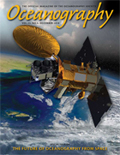
IPRC's Nikolai Maximenko and NASA's Eric Lindstrom are editors of the current issue of Oceanography, which features papers that give an overview of developments in remote sensing over the last few decades and how these developments open up new avenues of scientific inquiry. The intent of this special issue is to articulate areas of scientific inquiry that fuel the development of next generation satellite missions and to find out the upcoming challenges in oceanography using satellites.
Cloud Feedbacks Found to Amplify Global Warming
November 23, 2010 
IPRC’s Axel Lauer, Kevin Hamilton, and Yuqing Wang with colleagues at UHM and U. Wisconsin have just published a study using a new modeling approach that successfully simulates the observed cloud fields in a key region for climate. The study finds a greater tendency for clouds to thin with global warming than in any of the current global coupled climate models. Expected warming may thus be greater than currently anticipated.
Read Paper; Reporting climatescience; Climate Progress; Planetsave; DiscoveryNews; NewScientist.
Susan Avery Gives
The 2010 IPRC Lecture in Climate Science
November 9, 2010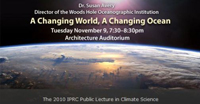
Susan Avery, Director of Woods Hole Oceanographic Institution, presented this year's IPRC Public Lecture in Climate Science. In "A Changing Word, A Changing Ocean" Dr. Avery described the importance of the oceans for sustaining human life and noted that much of what happens in the ocean is hidden from view below the surface. While explaining the serious challenges now facing the ocean from human impacts of various kinds, Dr. Avery emphasized the role of science in helping us cope with and mitigate these impacts.
Threshold Sea Surface Temperature for Hurricanes
and
Tropical Thunderstorms Is Rising
November 7, 2010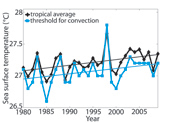
Scientists have known that atmospheric
convection in the form of hurricanes and tropical
ocean thunderstorms occurs when sea
surface temperature rises above a threshold. So how do rising ocean
temperatures with global warming affect this
threshold? If it does not rise, it could
mean more frequent hurricanes. The study by IPRC's Nat Johnson and Shang-Ping Xie shows this
threshold
is rising with global warming at the same rate as
tropical ocean temperatures. Their paper appears in
the Advance Online Publications of Nature Geoscience.
More in Our Amazing Planet, Planetsave, press release.
Hawaii May Face More Hurricanes
October 1, 2010
IPRC’s Tim Li is lead author of the article "Global Warming Shifts Pacific Tropical Cyclone Location" (in press) in Geophysical Research Letters, which predicts that with global warming tropical cyclone genesis will shift from the western towards the central Pacific. The modeling study suggests that more hurricanes will hit Hawaii in the future. NewScientist. Click image for larger view.
Yu Kosaka Awarded Prestigious Prize
 by Meteorological Society of Japan
by Meteorological Society of Japan
September 2, 2010
IPRC Postdoctoral Fellow Yu Kosaka has been awarded the Yamamoto-Shyono Medal by the Meteorological Society of Japan (MSJ) for her work on wave-like teleconnection patterns along the summertime Asian Jet. Each year the society selects two top papers written by young scientists for the award. Kosaka will receive the medal at the October fall meeting of the MSJ in Kyoto.
Predicting the North Atlantic Garbage Patch
August 19, 2010
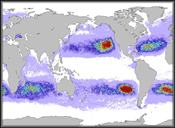 Over 22 years, undergraduates in the Sea Education Program collected plastic pieces at 6100 locations in the North Atlantic. The highest concentration of plastic they found was in the region predicted by the drifter-based model developed by IPRC’s Maximenko, pointing out this model's usefulness in guiding ocean clean-ups. More in Science, press release, Raising Islands, Hawaii Public Radio, TGDaily, and about the model.
Over 22 years, undergraduates in the Sea Education Program collected plastic pieces at 6100 locations in the North Atlantic. The highest concentration of plastic they found was in the region predicted by the drifter-based model developed by IPRC’s Maximenko, pointing out this model's usefulness in guiding ocean clean-ups. More in Science, press release, Raising Islands, Hawaii Public Radio, TGDaily, and about the model.
IPRC's Annamalai Quoted in Story on
Hottest Year Since Record-keeping
July 22, 2010
In a story by the Canadian Globe and Mail, IPRC senior scientist Annamalai was asked to comment on the revelation by the U.S. National Oceanic and Atmospheric Administration that Earth is on course for the hottest year since record-keeping began in 1880, that is, 0.7 degrees above the 20th-century average.
Sea-Level Rise Will Be Worse For Some,
We Just Don’t Know Who
July 16, 2010
Axel Timmermann was interviewed by Jess McNally on Wired Science about sea-level rise and winds and which islands in the Indo-Pacific region are threatened more by sea-level rise. Read more.
The North Pacific, a Global Backup Generator
for Past Climate Change
July 9, 2010
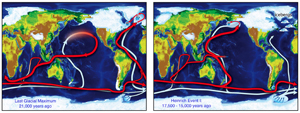 Toward the end of the last ice age, a major reorganization took place in the current system of the North Pacific, which may have buffered the global impacts of the collapsed circulation in the Atlantic, according to a study published by Yusuke Okazaki (JAMSTEC), Axel Timmermann (IPRC) and their international team in the July 9 issue of Science: read more in Science Centric, Planetsave, and Athena. Watch National Science Foundation interview.
Toward the end of the last ice age, a major reorganization took place in the current system of the North Pacific, which may have buffered the global impacts of the collapsed circulation in the Atlantic, according to a study published by Yusuke Okazaki (JAMSTEC), Axel Timmermann (IPRC) and their international team in the July 9 issue of Science: read more in Science Centric, Planetsave, and Athena. Watch National Science Foundation interview.
The Long-term Fate of the Oil Spill in the Atlantic
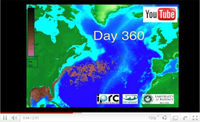
July 5, 2010
The possible spread of the oil spill from the Deepwater Horizon rig over the course of one year was studied in a series of computer simulations by IPRC’s Axel Timmermann and Oliver Elison Timm, and Fabian Schloesser, PHD student in oceanography at the University of Hawaii (read more). The animation based on these simulations is posted on YouTube. For more on Hawaii Public Radio, in Staradvertiser, DiscoveryNews, DailyFinance, The Consumerist, WIRED.CO.UK.
IPRC’s Yuqing Wang, a JMSJ Editor
July 5, 2010
Yuqing Wang, professor of Meteorology, has been selected as an editor of the Journal of the Meteorological Society of Japan (JMSJ). Wang's specialty in JMSJ will be tropical cyclones. His two-year term began on July 1, 2010.
IPRC Scientists Head Meteorology and Oceanography
Departments at UH Manoa
July 1, 2010
IPRC congratulates Bin Wang, elected Chair of the Meteorology Department, and Kelvin Richards, elected Chair of the Oceanography Department. Each starts a three-year term today.
Ocean Currents and Early Voyages
to the Americas
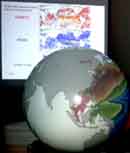
June 22, 2010
The History Channel program, “Who really discovered America?” features IPRC senior researcher Nikolai Maximenko. The movie explores several possible “discoveries” of the Americas before Christopher Columbus “staked his claim in 1492.” Maximenko’s work on ocean circulation provides information about ocean currents and whether they could have helped those early seafaring voyagers. The program is airing several times from June 22 - 28.
IPRC to Contribute to IPCC Climate Change Report

May 28, 2010
IPRC’s Shang-Ping Xie and Axel Timmermann have been selected to become lead authors on the 5th Asessessment Report of the Intergovernmental Panel on Climate Change Working Group 1: Xie for the chapter "Climate Phenomena and the Relevance for Future Regional Climate Change” and Timmermann for the chapter “Information from Paleoclimate Archives.”
Global warming likely to impact rainfall patterns
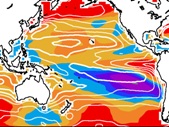 February 27, 2010
February 27, 2010
Ocean surface temperatures can be expected to increase mostly everywhere by the middle of the century, but the increase may vary by up to 1.5°C depending upon the region. These emerging ocean temperature patterns in the tropics and subtropics will lead to significant changes in rainfall patterns, according to work by IPRC’s Shang-Ping Xie and colleagues (more).
Kevin Hamilton talks about global warming on Honolulu Television
 February 25, 2010
February 25, 2010
IPRC Interim Director Kevin Hamilton was interviewed by KITV weather anchor, Justin Fujioka, on global warming issues. Observed climate changes, projected global warming trends, the uncertainties in climate models, and our basic understanding of climate variability were topics of particular interest. The interview was aired in two stories on KITV 10 pm news.
Ocean Sciences Meeting Press Conference: Plastic Oceans
![]() February 23, 2010
February 23, 2010
Plastic pollution has formed "garbage patches" in some parts of the ocean. At the AGU Ocean Sciences meeting in Portland, IPRC Senior Scientist Nikolai Maximenko discussed at a press conference how knowledge of surface currents and ocean mixing are helping to understand where the plastic debris comes from and what happens to it once it enters the oceans more in National Geographic News, Science News, BBC News. Maximenko also released a model at the conference, the Surface CUrrent Diagnosis (SCUD) model, which will help in tracking ocean debris.
News Archive: 2016 2015, 2014, 2013, 2012, 2011, 2010 2009, 2008, 2007, 2006, 2004, 2003, 2002, 2001, 2000

